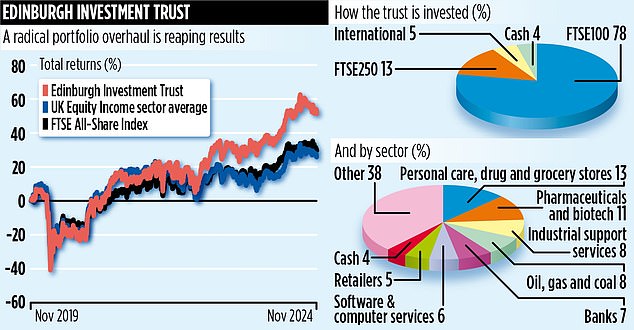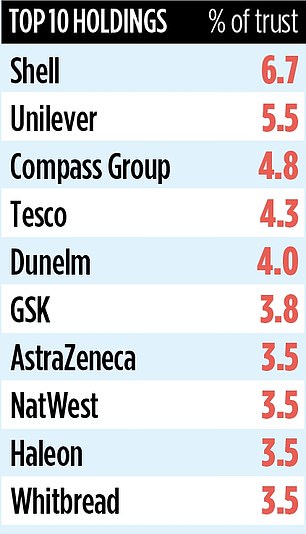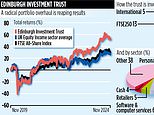Investment trust Edinburgh is in its best shape for quite a while. Last week, the £1 billion stock market-listed fund – investing in UK equities – reported half-year results to the end of September. Over the six-month period, it said shareholders had enjoyed total returns of 10.8 per cent, ahead of the FTSE All-Share Index (6.1 per cent).
Then, three days ago, it paid investors the first of its quarterly dividends for the current financial year. The payment of 6.9p a share was three per cent ahead of the equivalent divi last year.
The only disappointment is that the trust’s shares – like those of many (not all) competing UK equity income trusts – continue to trade at a double-digit discount to their underlying assets. Yet analysts at Investec Bank, in its latest note on the trust, describe the discount as ‘attractive’ and the fund as a ‘core strategic investment’.
Fund manager Imran Sattar and deputy Emily Barnard have run the trust’s assets since February this year. Modest to a tee, Sattar says the trust’s good financial health is more a result of the work done by his predecessor James de Uphaugh (now retired), who transformed the portfolio when he took over in March 2020.
At the time, de Uphaugh worked for asset manager Majedie, which has since been integrated into investment group Liontrust, for whom Sattar now works.
De Uphaugh’s appointment followed the sacking of Invesco’s Mark Barnett after three years of indifferent performance.

‘James made wholesale changes to the portfolio,’ says Sattar.
‘He pulled the trigger, transforming a portfolio of disadvantaged businesses offering investors attractive dividend yields into one comprising advantaged businesses with lower yields. When I took over, I inherited a well-positioned portfolio.’
The positive impact that both de Uphaugh and Sattar have had are seen in the performance numbers.
Since March 2020, data from Trustnet shows that Edinburgh has delivered total returns of 65 per cent. These compare with a 38 per cent return from the FTSE All-Share Index and a 30 per cent average return from its UK equity income peer group.
Today, the trust comprises 44 stocks and although it sits in the UK equity income camp, Sattar says the investment mantra is one of generating total returns for shareholders – an approach set in motion by de Uphaugh.

The result is a lower dividend than was being paid under the reign of Barnett, but one that is back in growth. Sattar is upbeat about the UK stock market.
He says: ‘If you look back two or three years, we had an economy riddled with low growth, big inflation, and high interest rates. Today, we have inflation and interest rates back in the pack [inflation did pick up last month, rising from 1.7 per cent to 2.3 per cent]. The high-risk premium associated with investing in UK equities has gone.’
On inflation, Satter accepts that next year’s hike in National Insurance rates for businesses – announced in last month’s Budget – will feed through to higher prices. But he insists: ‘I’m optimistic about the UK stock market.
‘It’s an environment conducive to picking stocks.’
The portfolio comprises familiar UK names such as furniture giant Dunelm, bank NatWest, Shell, and Auto Trader.
Trust annual charges total 0.48 per cent (on the low side). Its stock market identification code is 0305233 and the market ticker is EDIN.
DIY INVESTING PLATFORMS
Affiliate links: If you take out a product This is Money may earn a commission. These deals are chosen by our editorial team, as we think they are worth highlighting. This does not affect our editorial independence.


